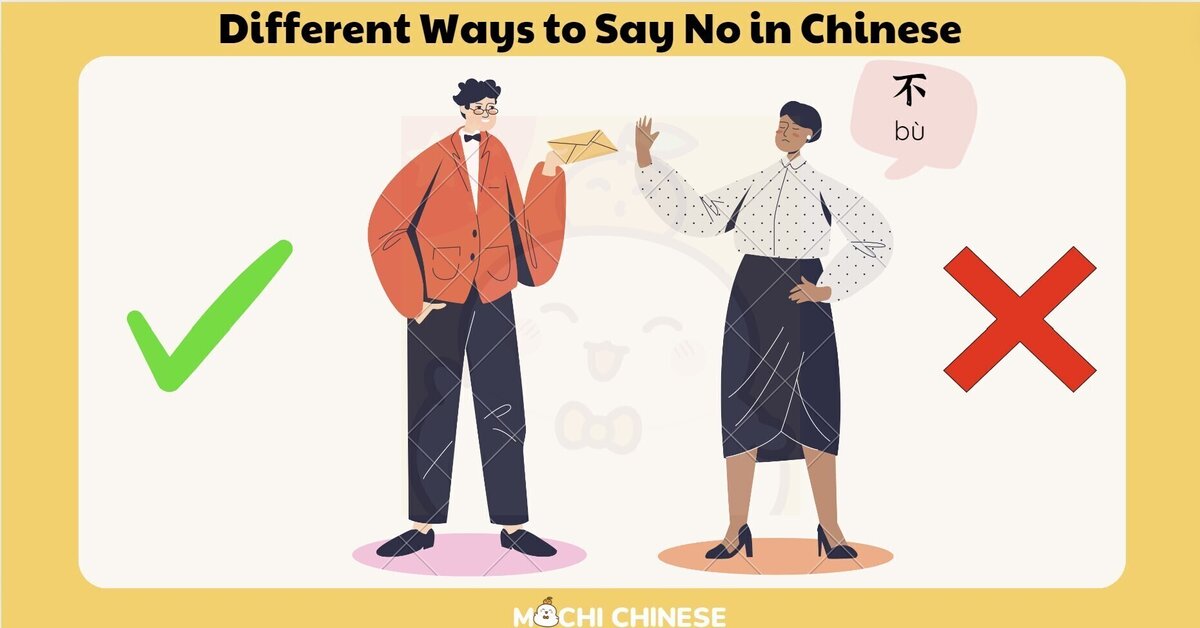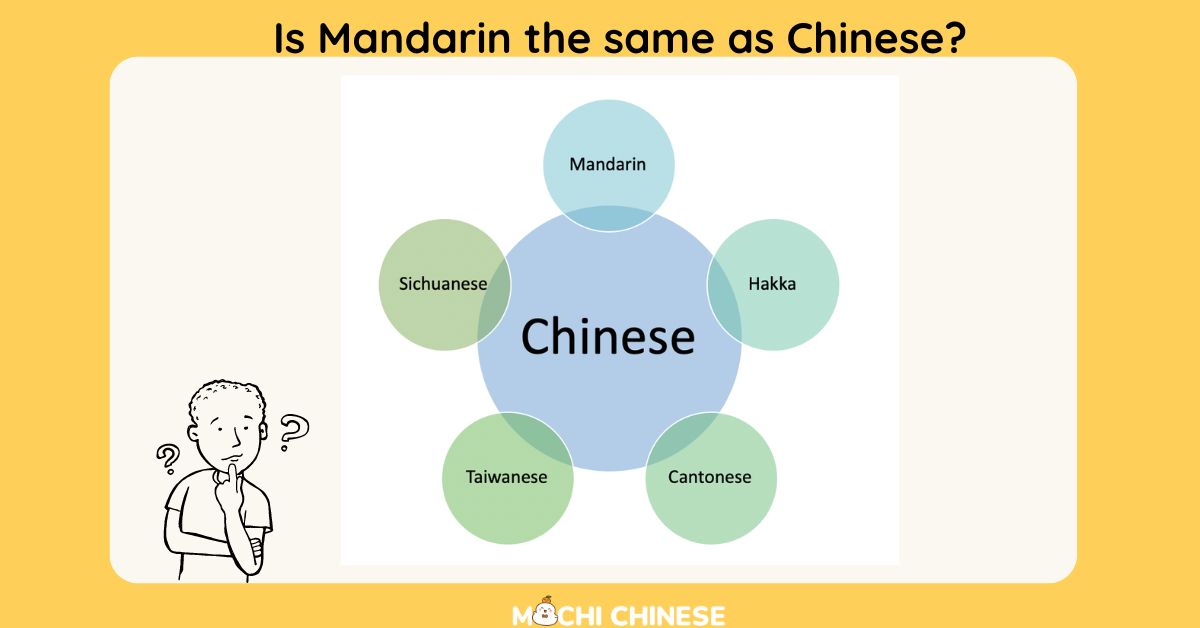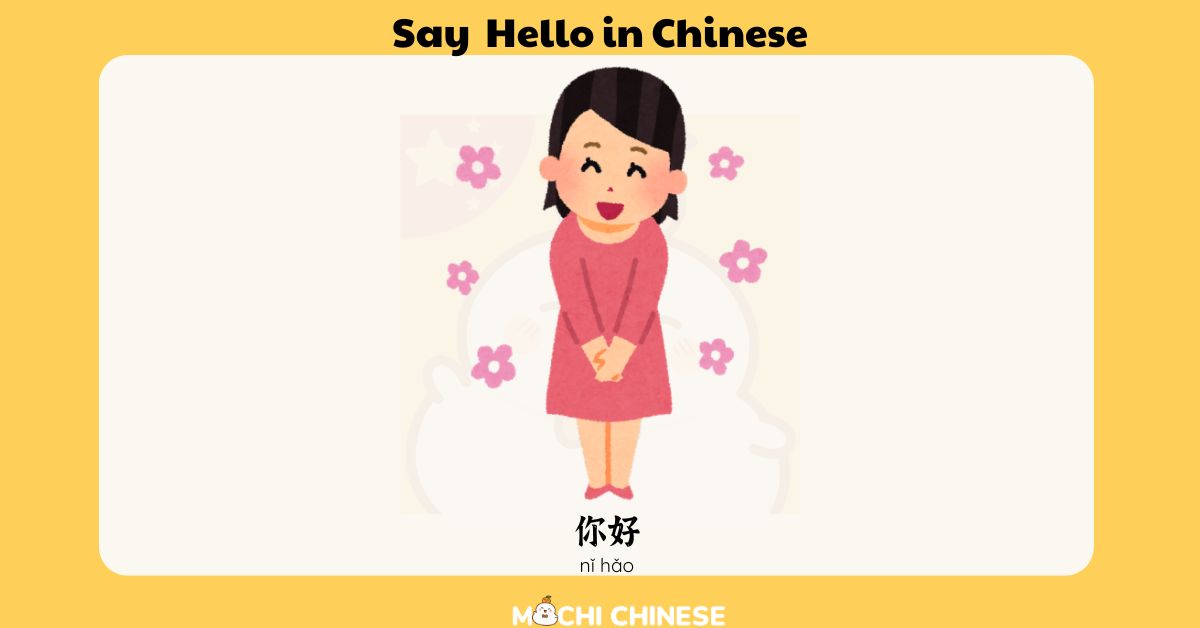Learning to say “no” politely in Chinese is an important part of understanding the language and culture. Directly using “不” (bù) can sometimes come across as too blunt or impolite. This guide will introduce various ways to soften your refusals and maintain politeness in different situations.
Why should we avoid Saying No “不” (bù) directly?
In Chinese culture, direct refusals can be seen as too strong or harsh. Avoiding a straightforward “不” helps maintain harmony and shows respect. This is especially important in social and professional settings. For example if someone invites you to an event you cannot attend, saying “不” might seem rude. Or when someone asks for assistance, a direct refusal can be perceived as inconsiderate. The words you use to indicate your disagreement or refusal of something depend largely on the context of the situation.

Gentle Ways to Say No in Chinese
我再想想吧 (Wǒ zài xiǎng xiǎng ba)
Instead of flatly refusing, you can use indirect language to soften the refusal and make it more polite. For example “我再想想吧” (Wǒ zài xiǎng xiǎng ba) – Let me think about it. This phrase suggests hesitation and contemplation, providing a polite way to decline without outright saying “No”.
我们下次再说吧 (Wǒmen xià cì zài shuō ba)
Besides, you can suggest another option is a polite way to refuse while still showing willingness to help or participate in the future. “我们下次再说吧” (Wǒmen xià cì zài shuō ba) – Let’s talk about this next time. This implies that you are open to discussing it later, making the refusal softer.
真的不用 (zhēn de bù yòng)
“Zhēn de bù yòng” (真的不用) is a Chinese phrase used to decline an offer for something tangible or specific. It means “really, there’s no need” and may require multiple rounds of negotiation before the person accepts the refusal. This phrase is often used when someone offers something specific or tangible.
我们下一次在去吧 (wǒ men xià yī cì zài qù ba)
Try “wǒ men xià yī cì zài qù ba” (我们下一次在去吧) (let’s go next time), is a polite way to decline an invitation, implying that the activity will happen but not now. It suggests that the person may ask again at a later time, indicating that the proposed activity will happen.
Softening Your Refusal
可能吧” (Kěnéng ba)
Modal particles can soften the tone of your sentences, making them sound less direct. You can use the phrase “可能吧” (Kěnéng ba) – Maybe, when you feel uncertainty which softens the impact of the refusal.
谢谢你, 但我不需要 (Xièxiè nǐ, dàn wǒ bù xūyào)
You can also start with a thank you can make the refusal sound more appreciative and less abrupt. Say “谢谢你,但我不需要” (Xièxiè nǐ, dàn wǒ bù xūyào) – Thank you, but I don’t need it. By expressing gratitude first, the refusal becomes more polite and considerate.
我不太清楚 (wǒ cua tai qīngchǔ)
When you want to avoid a question that you don’t want to answer, say “wǒ cua tai qīngchǔ” (我不太清楚). This phrase more literally means “I am not really sure.” This is a strategy used to avoid answering a question, as the person who asked the question will understand that you may know the answer but are unwilling to provide it.
我今天没有空 (wŏ jīn tiān méi yŏu kòng)
The phrase “wŏ jīn tiān méi yŏu kòng” (我今天没有空) also means “I don’t have time today.” It can be used to indicate that you are too busy to accept an invitation. These phrases suggest that accepting the invitation is out of your control due to already made plans, softening the blow of rejection. Combining phrases can further soften the blow.
Asking Questions Instead of Saying No
你能告诉我更多信息吗? (Nǐ néng gàosù wǒ gèng duō xìnxī ma?)
Use “你能告诉我更多信息吗?” (Nǐ néng gàosù wǒ gèng duō xìnxī ma?) – Can you tell me more information?. This shows interest and consideration before making a decision. Delaying a direct “No” by asking for more information can be an effective way to soften a refusal.
你能告诉我更多信息吗? (Nǐ néng gàosù wǒ gèng duō xìnxī ma?)
Delaying a direct “No” by asking for more information can be an effective way to soften a refusal. You can say “你能告诉我更多信息吗?” (Nǐ néng gàosù wǒ gèng duō xìnxī ma?) – Can you tell me more information?. This shows interest and consideration before making a decision.
不行 (Bù xíng)
“Bù xíng” (不行) (not okay) is a Chinese phrase used when someone requests permission but refuses to comply. For example, if someone asked to borrow your credit card, you might respond “bù xíng.”
不可以 (Bù kě yǐ)
“Bù kě yǐ” (不可以) is used when something is illegal or not allowed, similar to “bù xíng” but used when discussing something you have no control over.
When You Must Use 不 (bù)
Appropriate Times to Use 不
Sometimes, a clear and direct “No” is necessary, especially when there should be no ambiguity. Saying “不,谢谢” (Bù, xièxiè) – No, thank you, when you need to be firm and unambiguous in your refusal. However, the word 不 is not always impolite, even when using “不”, you can still maintain politeness by saying “很抱歉,我不可以” (Hěn bàoqiàn, wǒ bù kěyǐ) – I’m sorry, I can’t. Apologizing first makes the refusal more courteous and respectful.
Combining 不 with Politeness
Even when a direct “不” is required, you can still maintain politeness by combining it with courteous language. This approach balances clarity with respect, helping to soften the directness of your refusal. For example “很抱歉,我不可以” (Hěn bàoqiàn, wǒ bù kěyǐ – I’m sorry, I can’t). This phrase combines a clear refusal with an apology, acknowledging any inconvenience your refusal might cause and expressing regret.
Conclusion
Understanding and using these various ways to say “No” in Chinese helps navigate social interactions more smoothly and maintain harmonious relationships. By incorporating these polite forms of refusal into your conversations, you will find it easier to communicate effectively and respectfully in Chinese culture. Beginners are encouraged to practice these phrases and observe the positive impact on their daily interactions.
If you want to improve your ability to communicate fluently and coherently in Chinese, you need to build your vocabulary. If you want to conquer a language, vocabulary is definitely an important prerequisite. Every day, collect little by little by learning about Chinese culture, watching movies, listening to music, and writing down all the new words you see. The more terms you learn, the richer your Chinese vocabulary will become. Platforms like Mochi Chinese provide rich resources to expand your vocabulary.
Mochi Chinese helps learners memorize vocabulary effectively by using the Spaced Repetition (SRS) method, a technique for learning and reviewing vocabulary by increasing or decreasing the time between Chinese revisions based on the difficulty of the lesson. vocabulary (for learners’ memorization). Instead of focusing on short-term memory like the cramming method, SRS helps people who apply it remember information long-term. After learning vocabulary, the SRS algorithm will base on learning history to adjust the frequency and time of reviewing vocabulary. That means you’ll review words you don’t remember well more often, while words you know well will review less often. This method helps you focus on the areas that need the most attention, thereby improving overall learning efficiency.
Learning a language is not just about learning words but also about understanding and being passionate about culture and context. Practice Chinese every day, let Chinese integrate into your life and you will see yourself making a lot of progress.





